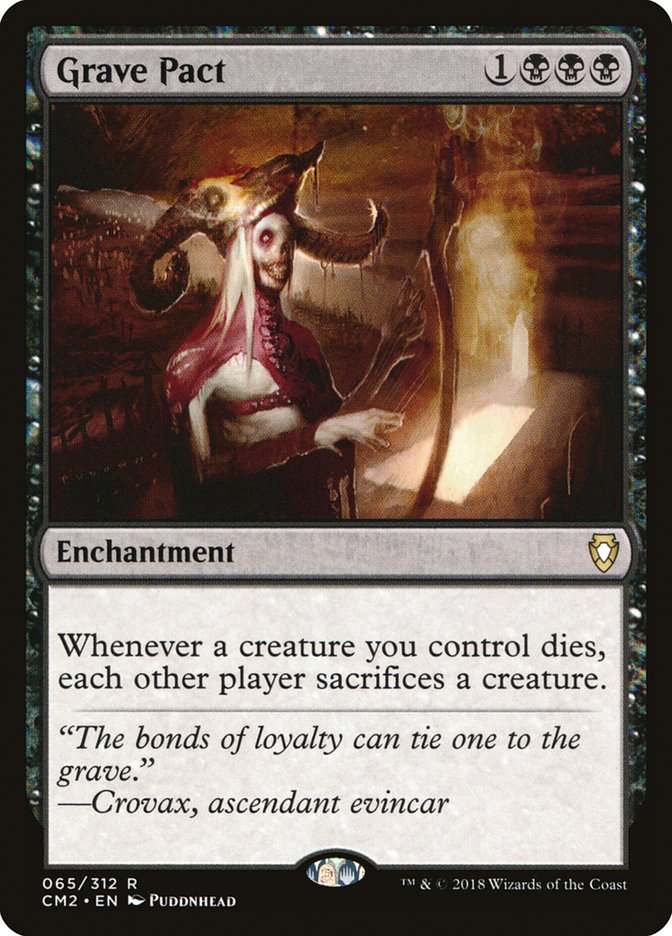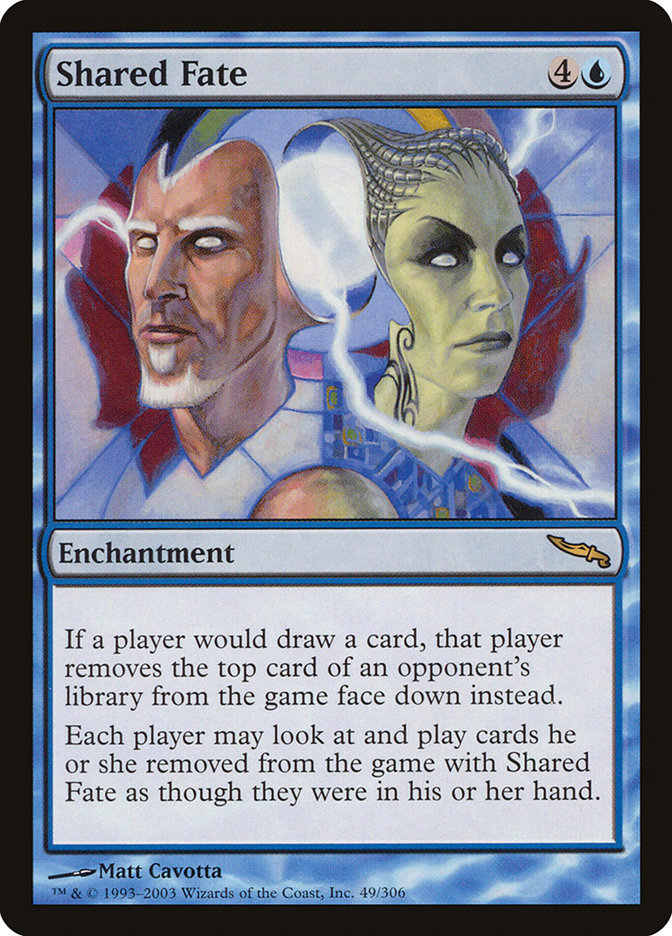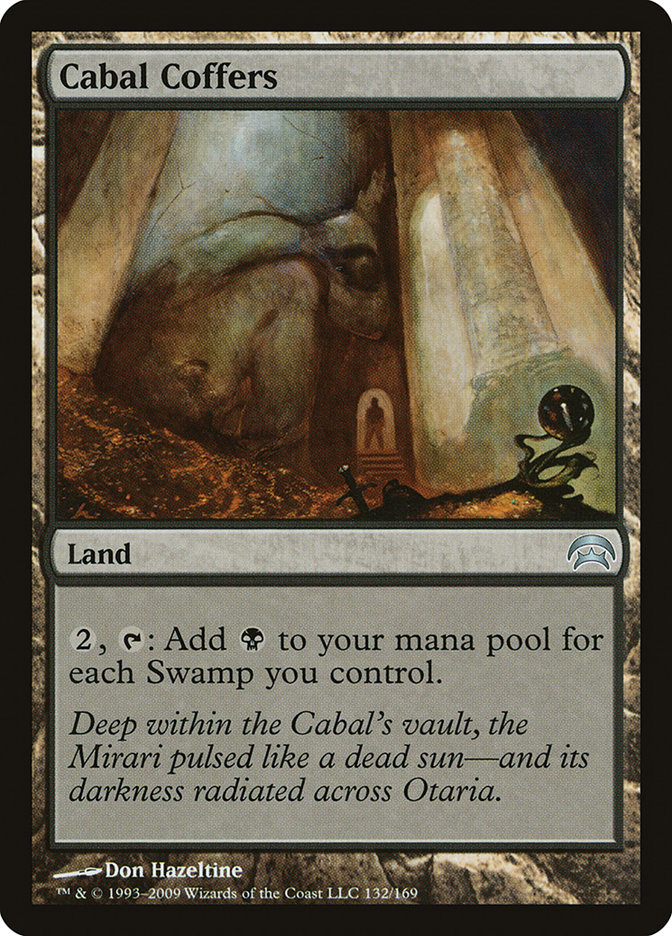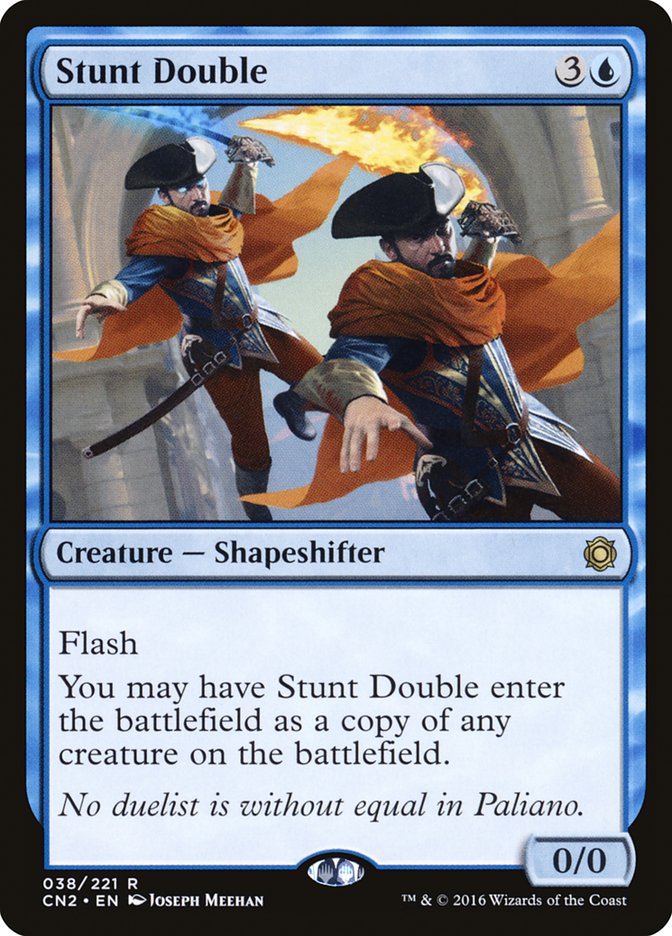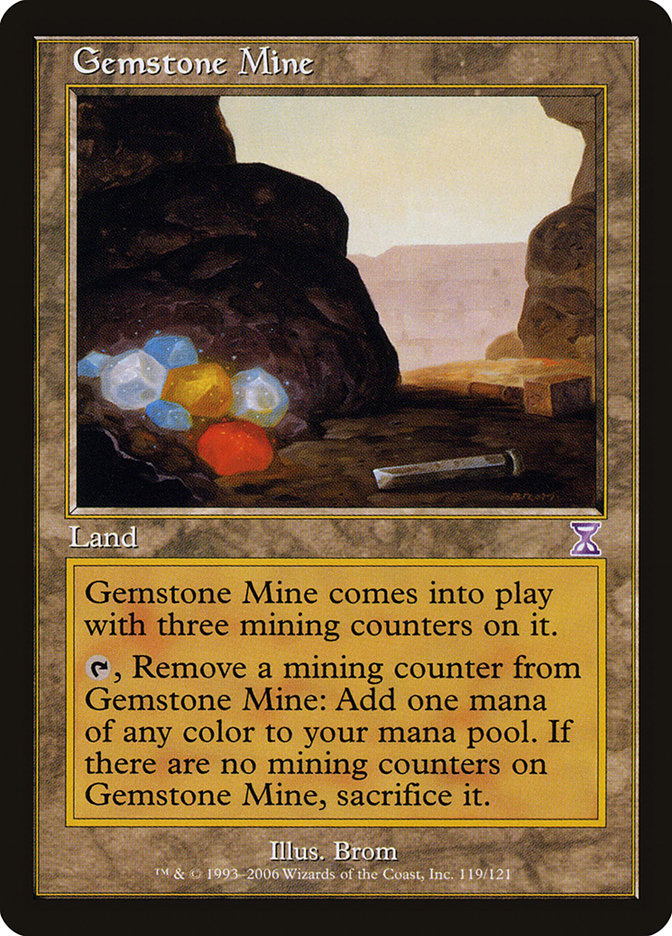In January of this year Netflix released a series called Tidying Up with Marie Kondo. In the series, Kondo visits various American family homes full of clutter and guides the families in tidying up their houses through her KonMari method. The KonMari method consists of gathering together all of one’s belongings, one category at a time, and then keeping only those things that “spark joy.” The internet joined in the fun, generating a ton of memes and funny takes on the philosophy. Magic culture got in the fun, with the funniest moment given to us by GP Sydney Winner Jess Estephan on Twitter:
Marie Kondo: What is this?
Me: It’s called Nexus of Fate
Marie: Does it Spark Joy
Me: Absolutely not
Marie: Thank it, and then discard it
Marie Kondo: And what is this?
Me: It’s called Nexus of Fate— Jess Estephan (@jesstephan) January 31, 2019
While the collector in me chafes at the idea of throwing away or donating a bunch of stuff that may be cluttering up my life, I am drawn to the idea of focusing on things that “spark joy.” I think keeping that notion in mind synchs up pretty well with how I approach Commander.
On Twitter last week, Sam @RhysticStudies put up a note where he pointed out Commander “is this format in which your opponents’ well-being is a non-zero factor in deck building, where you know that if they’re having a good time, you’re having a good time. So, you make efforts to meet them halfway, and perhaps resist playing an oppressive card for the benefit of someone sitting across from you.” It’s worth reading the whole note here:
— Sam (@RhysticStudies) March 4, 2019
The replies to Sam’s tweet were very heartening, with lots of people joining in and saying they felt very much the same. It inspired me to send out this tweet:
What sparks joy for you in #CMDR? One of mine is when an opponent asks to read a card I’ve played, & then I watch the thoughts reflect on their face going from puzzlement to realization, culminating with some combination of eye rolling, raised eyebrows, pursed lips & chuckling.
— Bennie Writes Magic (@blairwitchgreen) March 6, 2019
The replies were quite fun too!
Of course, it goes without saying that Commander fans love the format for a host of different reasons. But I thought it might be helpful to encourage those of you who may approach Commander quite differently than I do to consider Commandering like I do.
The Social Contract
All this of course ties back to what Sheldon Menery and the Commander Rules Committee’s philosophy when creating and tending to this format. If you haven’t read it in a while, it’s worth a few moments to check out, here on the Rules page, click on Philosophy. In my mind, what it boils down to is this—let’s all sit down and play some Magic. Sounds simple, right? Well, it’s a simple concept that can sometimes be difficult to execute, especially if you come to Magic from a competitive background where the primary focus is winning the game.
Let’s take for example the Banned List for Commander. In the RC’s philosophy document, they say that the Banned List is designed to present a shared vision of what the format should be, one which is “variable, interactive, and epic… where memories are made.” The Banned List gives you a context for the sort of Magic that doesn’t play well in Commander. It’s meant as a guiding force that you should keep in mind way before you ever sit down to play a game; it should help you know which sort of cards you shouldn’t be putting in your deck, even if that specific card isn’t technically banned.
If you’ve read me before, you probably know I’m not a big fan of Grave Pact and cards of its ilk. The thing is, the card is perfectly fine when used as a way to punish people for killing your creatures, but most people don’t leave it there. Instead, they take push it to its logical conclusion, setting up some sort of recursion sacrifice engine where you force everyone else into a game state where no one can ever keep a creature on the battlefield. That pretty much takes away a key joy in the format—always being able to cast your commander. I pretty much don’t want any opponents to ever feel that they have to just stop casting their commander because I’ve set up some sort of lockdown on creatures. Yes, it’s legal to do so, but to me it violates the social contract. I want everyone to be able to have a fun game of Commander, no matter who wins in the end.
Maximize Joy
When extolling the virtues of Commander, one thing I like to do is contrast it with the mindset of a competitive tournament Magic player. I’m able to do that because I love competitive tournament Magic. I’ve played in a lot of tournaments over the years, and have had great success at the local store and state levels.
What sparks joy in tournament Magic players? For many of them, it’s all about winning, which to me seems a bit unrealistic and corrosive. After all, there’s only going to be one tournament winner. If you have a whole tournament filled with people who only get joy out of winning, each round half of those people are going to be unhappy. Thankfully, I think most competitive Magic players are able to find joy in other things – a strong overall record, noticeable improvement in their tournament performance, learning new nuances to their deck, and making strong plays. Magic is a social game, so you can also find joy in the successes of your friends even if your own tournament performance has fallen off the rails.
If you think about it, finding joy in Magic, as with just about anything, is about your mindset. If the only way you’re going to be happy is if you win the big Magic tournament, you are probably not going to be happy. Winning a Magic tournament requires a lot of things go right, and not all of them are under your control.
When it comes to Commander, you control the mindset you bring to each game. How do you find joy in a game of Commander? Let’s say it’s about winning. Well, in a typical four-player game of Commander, you have a 25% chance of finding joy. If everyone has that same mindset, then that means 75% of the people playing aren’t going to be happy. Which then makes you wonder—why bother playing a game where 75% of the people walk away unhappy?
I think when you play Commander, you need to de-emphasize actual “winning.” That’s not to say you shouldn’t try to win, but winning isn’t everything. For me, winning a game of Commander is icing on the cake. I get joy from so many other things. For instance:
- When I cast a card that someone has to read because they’ve never seen it before.
- When someone else casts a card that I have to read because I haven’t seen anyone cast it in a long time.
- When my fiendish secret combo takes the table unaware for the first time.
- When someone else’s fiendish secret combo takes me completely by surprise for the first time.
- When I figure out some cool synergy I didn’t realize was even in my deck.
- When someone else shows me some cool synergy I hadn’t ever thought about before.
- When someone comes out of nowhere and snatches victory away from the people who had otherwise been dominating the game.
- When I get to play a pet card from a newly released set for the first time and it’s as good as I hoped it would be.
- When I learn something new.
In any game of Commander, the odds are pretty good that a few things on this list will happen, and so for me that game of Commander will be a success! It’s all about setting your expectations and mindset.
Play Cards That Encourage Interaction
In competitive Magic, there are two basic approaches towards winning a game—either you can aggressively push your own plan, or you can reactively stop your opponent from enacting their plan and eventually get around to winning. Both are certainly valid approaches in a tournament setting, but for Commander I think it’s better to lean towards pushing your own plan. Remember, if everyone can play their cards and do their things, the odds go up that each person will be checking off their internal list of things that spark joy and making that game of Commander a success for everyone.
That’s not to say you shouldn’t have reactive cards that can control some of what your opponents are doing—not at all! You should definitely play cards that answer things your opponents are doing. Card interactions are what Magic the best game in the world! But you shouldn’t dedicate most of your deck into shutting down everything your opponents are trying to do. If your approach leads to situations where your opponents are drawing cards and passing the turn without being able to participate in the game and you haven’t won yet, you’ve made an error. You’ve eliminated your opponents from having any fun in the game, and if you’re honest with yourself, you’re probably not having all that much fun either.
So yes—if you’re playing blue, have some counterspells in your deck, but save them to protect your creatures or a key permanent from removal, or to stop someone from executing a fast combo. Don’t stuff your deck with mass land destruction, but do play a few pinpoint land destruction spells or abilities that can check someone’s Cabal Coffers or Maze of Ith. Play a few sweeper spells to keep the token player from getting out of hand, but don’t set up a Grave Pact engine that pretty much locks everyone out of ever casting another creature spell. Play a balance of interactive spells along with plenty of cards that advance your own agenda that your opponents will want or need to interact with, and you’ll have games that are much more fun.
Always Choose Cool Over Efficient
If you regularly read my column, you’ll know that I’m a stickler for having a decent mana curve when building a Commander deck, and I understand the urge to play the very best cards you can find for each slot in your deck. But honestly, sometimes efficient is boring. Take for instance Counterspell and Arcane Denial. Both cost two mana, though Arcane Denial requires less blue mana so it’ll be easier to cast in multicolor decks. Counterspell is clearly the “best” way to counter a spell ever printed in Magic, but I very rarely ever put Counterspell in my blue decks. I think Arcane Denial is cooler because of the card draw attached. Yes, you get to stop an opponent from casting something, but they get to draw two cards and you get to draw another card for the trouble. It takes the sting out of it for them, and helps keep the game flowing. It’s not that I don’t want my opponent to play the game; I just didn’t want my opponent to resolve that one particular spell.
I consider Harmonize way cooler than Demonic Tutor. That may seems like a weird comparison but hear me out. Both cards represent one or more other cards after investing the card and mana to cast it. Demonic Tutor is incredibly efficient, because for very little mana you get to go find the exact perfect card you need from your deck. It can be the last remaining card you need for some combo engine, it can be some monstrous creature that nobody can deal with, or it can be the perfect answer to some dilemma you’re facing on the battlefield. But when you pack your deck with too many cards like Demonic Tutor, each game of Commander ends up playing out the same way. In which case, why is it that you’re playing a singleton format again?
Harmonize could end up being one of the cards you need or want at the time, but you just don’t know. That’s the fun of it—draw three cards and see what you get. It’s much faster to resolve than Demonic Tutor, you play it, you draw, the game moves along. When building my Commander decks, I definitely try to lean away from efficient cards like Demonic Tutor and Counterspell and play more cards like Arcane Denial and Harmonize.
Consider copy spells like Stunt Double rather than stealing effects like Control Magic. I know stealing someone’s huge threat is an efficient way to answer a problem while also presenting your own threat. But it’s a serious blow to morale when something like that happens, especially if its their commander. If the card is a worthy threat, copying it makes a much more interesting and interactive game of Magic.
Embrace the Underdog
In many respects our culture loves an underdog. We love the someone beating the odds and doing something awesome. I’ve been playing Magic a long time and Commander since nearly the beginning of the format. I know I can build some pretty crazy decks, but I get a ton of joy from watching someone who’s relatively new to the format, someone whose collection is just getting started, shocking the table when they come out of nowhere and snatch a rare victory. There’s a brand-new player inside each of us, and if we can see that earlier version of us in other newer players, it can bring us a lot of pleasure even in games we lose.
Dig For Hidden Gems
Magic is super deep, y’all. We all know this, but it bears repeating and keeping in the front of your mind. One of the reasons I’ve been able to love this game nonstop for as long as I have – 25 years now – is because each new set basically reinvents the game, especially when you play Commander that can make use of cards throughout Magic’s history. Each time a new set releases, there are cards that interact with old cards in brand new ways, so it’s a good idea to check in with Magic’s history to see if an old card gathering dust in the back of a binder can potentially do something incredibly cool with a new card or mechanic. Even though the Commander hive mind will be doing the same sort of thing with each new set, there is always the chance that you’ll see something nobody else has. And when you bring that new hotness to your local Commander game table and bust it out, you’re going to get so much pleasure from the smiles and high fives from your friends.
I’m not saying there’s anything wrong with playing Commander differently, especially if you and your friends prefer it that way. But I do feel that you’re putting limits to the enjoyment to some degree. And if you’re going to a gathering of Commander players outside of your normal group, odds are pretty good that most of those players aren’t looking for games where you lock everyone out or combo kill on Turn 3. If you Commander like me, I guarantee you can pretty much find a fun game no matter where you go and who you play.
Please tell me what you think! And make sure you’re following me on Twitter, since I tweet a lot about Commander. And right now, I’m building a Commander deck with votes from the Magic community over Twitter, so follow the hashtag #TwitterBuiltCMDR.
Do me a solid and subscribe to my channel too! I’m posting Top 5 cards from many of my Star City Games columns as a preview for each article, but I plan on adding other content too. Also, I’ve gotten some cool video editing software that I’m slowly learning, so the video quality will improve as I learn better techniques.
Deck Database
Below I’ve got links to decks I’ve written about going back to January 2017. If you want to read the associated article, just put “Bennie Smith” and the commander name into Google and it should pop right up. I’ve written a lot about Commander — and Magic in general — so if you want to explore further, the Star City Games article archives have my articles all the way back to January 2000!
Ravnica Allegiance
The Haunt of Hightower, Teysa Karlov, Prime Speaker Vannifar, Rakdos, the Showstopper, Nikya of the Old Ways, Lavinia, Azorius Renegade, Judith, the Scourge Diva
SCG CON Winter 2018
Yuriko, the Tiger’s Shadow, Grothama, All-Devouring; Kynaios and Tiro of Meletis; Feldon of the Third Path; Ramos, Dragon Engine; Inalla, Archmage Ritualist; Prossh, Skyraider of Kher; Brago, King Eternal
Ultimate Masters
Guilds of Ravnica
Niv Mizzet, Parun, Emmara, Soul of the Accord, Lazav, the Multifarious (decklist in the comments), Tajic, Legion’s Edge, Etrata, the Silencer, Izoni, Thousand-Eyed
Commander 2018
Aminatou, the Fateshifter, Xantcha, Sleeper Agent, Lord Windgrace, Brudiclad, Telchor Engineer
Core Set 2019
Sai, Master Thopterist, Goreclaw, Terror of Qal Sisma, Vaevictis Asmadi, the Dire, Chromium, the Mutable
Battlebond
Dominaria
Teshar, Ancestor’s Apostle, Grand Warlord Radha, Arvad the Cursed, Muldrotha, the Grave Tide, Slimefoot, the Stowaway, Yargle, Glutton of Urborg, Squee, the Immortal, Firesong and Sunspeaker, Jodah, Archmage Eternal, Tiana, Ship’s Caretaker
Masters 25
Rivals of Ixalan
Azor, the Lawbringer, Etali, Primal Storm, Nezahal, Primal Tide, Zacama, Primal Calamity, Tetzimoc, Primal Death, Zetalpa, Primal Dawn, Ghalta, Primal Hunger
Unstable
Grusilda, Monster Masher, Dr. Julius Jumblemorph
Ixalan
Vona, Butcher of Magan, Tishana, Voice of Thunder, Admiral Beckett Brass, Gishath, Sun’s Avatar
Commander 2017
Nazahn, Revered Bladesmith, Inalla, Archmage Ritualist, Mirri, Weatherlight Duelist, O-Kagachi, Vengeful Kami, Mairsil, the Pretender, Taigam, Ojutai Master
Razaketh, the Foulblooded, Zur, the Enchanter (Mummy’s Curse), Djeru, With Eyes Open, The Locust God, Karona, False God (All the Deserts), Nicol Bolas, Neheb, the Eternal
Amonkhet
Oketra the True, Temmet, Vizier of Naktamun, Atogatog (Cartouches & Trials), Hapatra, Vizier of Poisons, Samut, Voice of Dissent, Rhonas the Indomitable, Hazoret the Fervent
Kaladesh Block
Yahenni, Undying Partisan, Nicol Bolas, Child of Alara (Five-Color Energy), Rishkar, Peema Renegade, Kari Zev, Skyship Raider, Sram, Senior Edificer
Commander 2016
Breya, Etherium Shaper, Atraxa, Praetors’ Voice, Tymna the Weaver // Ravos, Soultender
Other Commander Decks
The Ultimate Golgari Deck, Anafenza, the Foremost (shutting down shenanigans), Momir Vig, Simic Visionary (no green creatures), Kytheon, Hero of Akros (Tribal Gideon), Tasigur, the Golden Fang
Commander Strategy
Commander Compare & Contrast: Nahiri, the Lithomancer


